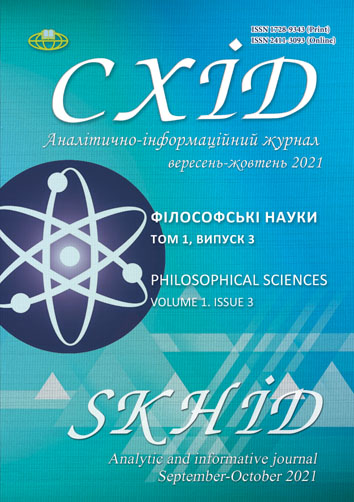THE POLITICAL NATURE OF THE CHURCH ACCORDING TO STANLEY MARTIN HAUERWAS, WILLIAM T. CAVANAUGH AND WALTER BRUEGGEMANN
DOI:
https://doi.org/10.21847/1728-9343.2021.1(3).243529Keywords:
church, polis, ecclesiocentrism, Stanley Hauerwas, William Cavanaugh, Walter BrueggemannAbstract
In the context of the fragmented and multiple theological discourse of postmodernism, one of the important themes that unites modern theologians and political theologians in particular is the theme of the Сhurch. However, it is not about the Сhurch in general, but about those special features and dimensions that have been forgotten or lost in the modern era. Primarily, it is related to the political dimension of the Christian community, which has become the subject of research by representatives of various theological schools.
This article is devoted to the theological analysis of the ecclesiology of three prominent contemporary theologians: Stanley Hauerwas, William Cavanaugh and Walter Brueggemann. Each of them, despite belonging to different schools, different areas of interest and church affiliation, addresses the topic of the political nature of the Church in search of a constructive response to current challenges. According to Hauerwas, there should be a restoration of the vision of the Christian community as an alternative to the world in which it is located. For Hauerwas, the Church is not only a community, one of many, but a polis, which challenges both modern empires and dominant ideologies. This is exactly what William Cavanaugh is talking about, when he emphasizes that the Church's tragic loss of its own political dimension has led to the "migrations of the Holy" and the sacralization of ideologies and power structures. At the same time, Walter Brueggemann writes Church’s prophetic authority and practical capability to resist the "royal consciousness", which manifests itself in the demonstration of strength and power, as an important feature of the Church.
Downloads
References
Brueggemann, W. (1978). Prophetic Imagination. Philadelphia : Fortress Press.
Budde, M. (Ed). (2000). The Church As Counterculture. State University of New York Press.
Cavanaugh, W., Scott, P. M. (Eds). (2019). The Wiley Blackwell Companion to Political Theology. John Wiley & Sons Ltd
Cavanaugh, W. (2011). Migrations of the Holy: God, State, and the Political Meaning of the Church. William B Eerdmans Publishing company.
Hovorun, C. (2015). Meta-Ecclesiology: Chronicles on Church Awareness. Palgrave Macmillan.
Hauerwas, S. (1994). Dispatches from the front. Duke University Press.
Hauerwas, S., Willimon, W. H. (1989). Resident Aliens: Life in the Christian Colony. Abingdon Press Nashville, 25.
Rasmusson, A. (1995). Church as Polis, The: From Political Theology to Theological Politics as Exemplified by Jürgen Moltmann and Stanley Hauerwas. University of Notre Dame Press.
Stephenson, L. (2011). Prophetically Political, Politically Prophetic: William Cavanaugh’s “Theopolitical Imagination” as an Example of Walter Brueggemann’s “Prophetic Imagination”. Journal of Church and State, 53(4): 567–586. https://doi.org/10.1093/jcs/csr010
Volf, M., Crieg, C., & Kucharz, Th. (Eds). (1996). The future of theology: Essays in Honor of Jurgen Moltmann. Grand Rapids, Michigan/Cambridge, U.K.: William B Eerdmans Publishing company. https://doi.org/10.1177%2F0040571X9710000609
Downloads
Published
How to Cite
Issue
Section
License
Copyright (c) 2021 Valerii Sekisov

This work is licensed under a Creative Commons Attribution-NonCommercial-NoDerivatives 4.0 International License.
1. Authors bear responsibility for the accuracy of facts, quotations, numbers and names used.
2. Manuscripts are not sent back.
3. The publisher does not always agree with the authors' opinion.
4. The authors reserve the right to authorship of the work and pass the first publication right of this work to the journal under the terms of a Creative Commons Attribution-NonCommercial-NoDerivatives 4.0 International License. This license allows others to distribute (copy) the published work for non-commercial purposes, provided there is mandatory attribution to its authors and a link to the first publication in our journal.
5. The authors have the right to conclude separate supplement agreements that relate to non-exclusive work distribution in the form in which it has been published by the journal (for example, to upload the work to the online storage of the journal or publish it as part of a monograph), provided that the reference to the first publication of the work in this journal is included.

